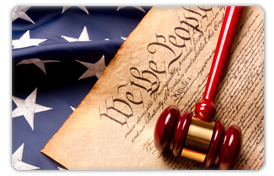Chapter 11 Attorney

Chapter 11 is a chapter of the United States Bankruptcy Code which
permits reorganization under the bankruptcy laws of the United States.
Chapter 11 bankruptcy is available to every business, whether organized
as a corporation or sole proprietorship, and to individuals, although it
is most prominently used by corporate entities. When a business is
unable to service its debt or pay its creditors, the business or its
creditors can file with a federal bankruptcy court or protection under
either Chapter 7 or Chapter 11.
A chapter 11
case begins with the filing of a petition with the bankruptcy court
serving the area where the debtor has a residence. A petition may be a
voluntary petition, which is filed by the debtor, or it may be an
involuntary petition, which is filed by creditors that meet certain
requirements.
Generally, a written disclosure
statement and a plan of reorganization must be filed with the court. The
disclosure statement is a document that must contain information
concerning the assets, liabilities, and business affairs of the debtor
sufficient to enable a creditor to make an informed judgment about the
debtor's plan of reorganization. The contents of the plan must include a
classification of claims and must specify how each class of claims will
be treated under the plan.
As with cases under other
chapters of the Bankruptcy Code, a stay of creditor actions against the
chapter 11 debtor automatically goes into effect when the bankruptcy
petition is filed. The automatic stay provides a period of time in
which all judgments, collection activities, foreclosures, and
repossessions of property are suspended and may not be pursued by the
creditors on any debt or claim that arose before the filing of the
bankruptcy petition. The stay provides a breathing spell for the debtor,
during which negotiations can take place to try to resolve the
difficulties in the debtor's financial situation.
A
major role in chapter 11 cases is played by Creditors' Committees. The
committee is appointed by the U.S. trustee and ordinarily consists of
unsecured creditors who hold the seven largest unsecured claims against
the debtor. Among other things, the committee consults with the debtor
on administration of the case; investigates the debtor's conduct and
operation of the business; and participates in formulating a plan. A
creditors' committee may, with the court's approval, hire an attorney or
other professionals to assist in the performance of the committee's
duties. A creditors' committee can be an important safeguard to the
proper management of the business by the debtor in possession.
While
declaring bankruptcy can be a difficult decision and can seem like
you're facing a complicated resolution, our experienced attorneys are
here to help. Call for a free consultation to discuss your situation
and set a plan that is right for you.
 Why Choose Us?
Why Choose Us?
- Appointment flexibility
- Evening hours
- Free initial consultation
- Providing bankruptcy advice for over 33 years
Services
Call Today! (301) 424-8520